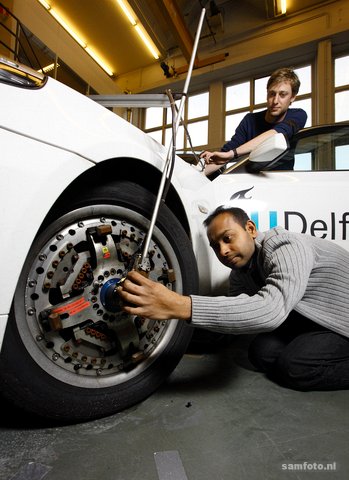When it’s not undergoing testing on an airstrip in Katwijk, you can find a sporty white car sitting right inside the 3mE building of the TU Delft. The Delft Center for Systems and Control runs an automotive laboratory focusing on Intelligent
Automotive Systems.
In a lofty open area in the Precision and Microsystems Engineering department, the car sits plastered with stickers of TU Delft and SKF. SKF is a worldwide leader in manufacturing and supplies, among other things, ball bearings. The students and researchers in the automotives lab are using these specially equipped bearings to improve the performance of ABS brakes.
On the brink of unique findings, researcher Ir. Stijn Kerst (3mE, PME) of the Netherlands, is busy testing and collecting data from the bearings. Instead of the traditional ABS brakes that depend on wheel acceleration, the special SKF bearings offer force based ABS control. “The automotives lab in Delft is one of the leading labs in the world to be doing this research,” says Kerst. In theory, this type of ABS brakes work better and are no more expensive than what cars are using today.
While Kerst is working on the forward movement or ‘x axis’, Anil Kunnappillil Madhusudhanan (3mE, PME) is focusing his PhD research on a working theory for the lateral movement or ‘y axis’. The lateral movement of a car is controlled by the steering. Madhusudhanan is researching methods for car safety during sliding. A driver may apply high steering, also referred to as over-steering, during a sliding incident and Madhusudhanan’s work is to correct this. “I’ve been working on this theory for two years and I hope to be able to apply it directly to the car in the lab,” says Madhusudhanan.
Real hands
The opportunity to work on a real vehicle is what sets the automotive lab at TU Delft apart. Students and researchers have the opportunity to engage in real hands on work with the car. They make work on theory out of the lab, but then get to apply that theory literally right on the vehicle. They can take their research and actually race it down a runway. With the ground breaking research coming to a head with the ABS brakes, the future is now. Kerst notes that, “The lab could see this new application being put to use in the near future.” “Everything that we are working on could be integrated to work as a system,” adds Madhusudhanan. They envision a future of safer cars. New ABS brakes, corrective steering and more will come together and work as a unit with the combination of all systems integrated for a higher model of safety.
The automotive lab is also seeing some new research equipment coming in. Currently, suspension in cars is now passive, reacting to bumps and unevenness in the road. A new type of active suspension is being developed. This suspension is will anticipate problems ahead of time and could also be integrated with the other safety features. New research ideas and students who are keen to work in such a hands-on laboratory are very welcome. What would you do to change the way a car works?



Comments are closed.